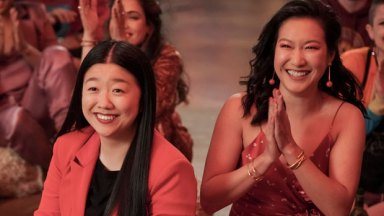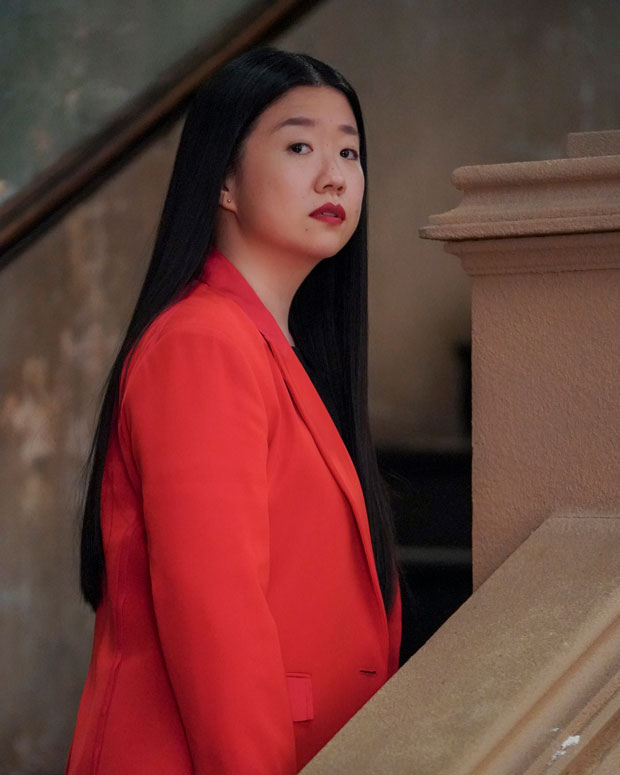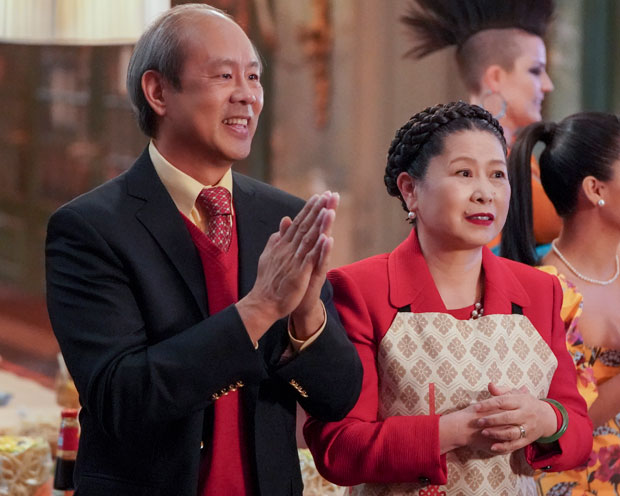
Alice hosted a Lunar New Year celebration at the Coterie during the August 11 episode of Good Trouble, and the night was full of pivotal moments. Alice enlightened her fellow roommates about her Asian culture and opened up about being an Asian woman. She also had important discussions with her parents and brother.
HollywoodLife got the EXCLUSIVE scoop from Sherry Cola about Alice’s major season 3 episode. Sherry admitted she was on “cloud nine” after getting the chance to showcase Alice’s Chinese culture. She opened up about how the show has “liberated” her offscreen and teased what’s next after that kiss between Alice and Sumi.

The Lunar New Year really put the spotlight on Alice. How did this episode come about?
Sherry Cola: Joanna Johnson is really my queen. She recognizes my fight and my passion as Sherry. She truly honors and respects that in the stories on Good Trouble. I’ve been very vocal about having a Lunar New Year episode because we celebrate Christmas, we celebrate Valentine’s Day. Lunar New Year is also a holiday that is recognized in so many places and cultures and families. I just was very adamant and hoping to get one, and she gave it to me. I’m on cloud nine about it.
I absolutely loved the speech that Alice gives to everyone. One of the lines that really stood out to me was when Alice said she was trying to feel American while keeping her Asian traditions alive. Did you have a hand in writing this speech?
Sherry Cola: This whole episode, the filming process was really emotional because it was the end of March, beginning of April 2021, which was when the height of the anti-Asian hate crimes was happening. Joanna knows that I’m very vocal about the community and representation and just fighting for what we deserve in real life. She actually gave me the liberty to make this speech my own. I just put my words together, and I really spoke from an honest place. It means a lot because, as Alice starts to find her voice, the fact that me as Sherry got to kind of speak through Alice with words that I really feel. There was so much going on in my head and in my heart. That speech, I’m so happy with it. It said everything we’ve been dying to say as a community.
I feel like the intersection of your personal feelings and Alice’s feelings must have been fun for you to explore.
Sherry Cola: Absolutely. You know we’ve seen Alice evolve and grow so much from season 1. I say the same thing about myself. I’m not the same person I was before Good Trouble. I’ve learned to be a better ally. I’ve learned to speak up and speak out in so many ways. With our show, the title is literally named after the words of the late great John Lewis. Every one of our characters is so layered, so authentic, and really just fighting for something and finding the purpose in life and doing good while truly making mistakes. That’s the most human thing. That’s why Good Trouble is the perfect TV show, and I’ve said that a million times because I truly mean it. I’m so grateful that I’m on a show that I’m proud of, that I’m a fan of, and that I believe in. I was so grateful for my own journey of me just amplifying the community and using my own voice and seeing the power of that ripple effect. I don’t know if I could have done it if it wasn’t for the show, to be honest. I’m very, very grateful and never take that for granted.
The show does a great job in general of bringing important issues to the forefront in a way no other show does.
Sherry Cola: You know Good Trouble has been ahead of its game. The fact that we touch on Black Lives Matter, trans rights, equal pay, the complex queer Asian experience. All of the things under the sun, and it’s not in a way that forces it down your throat. It’s in a way that feels real because this is truly a reflection of what’s going on in the world. We’re having these difficult conversations, and we have been for years. We’re calling things out as they should be. It’s really the best-case scenario being on the show and just representing in this way.
Alice does have a very emotional discussion with her parents. How did it feel to progress that story between Alice and her parents? I feel like she finally got out everything she needed to say.
Sherry Cola: I think something I’ve learned in my 31 years is that as Asian children we need to communicate with our families more in all departments. This past year with me going through the protests and me preaching to my mom about certain things. She voted for the first time ever. She’s been an American citizen since I was in seventh grade, so these conversations are so overdue and so necessary. We didn’t know how to talk to our immigrant parents before, and that’s the truth. I’ve learned so much in the past few years down to even sexuality. Like, dating wasn’t talked about at the dinner table, let alone queerness. Good Trouble has also liberated me in that sense. When I booked this role, I ended up coming out to my mom as bisexual. It’s something I’ve been holding in forever, and it’s such a weight off my shoulders. I really feel like I spread my wings because of the show. You learn to have these tough conversations that you put off for so many years, and that’s kind of what happened between Alice and her mom. I can’t speak for every single immigrant household, every single Asian mom, but sometimes Asian moms show tough love. Tough love is really what Alice’s mom does with Alice. I’m paraphrasing but Alice’s mom says something like, “Life can be hard for someone with a sweet heart like yours.” That’s the conversation that you don’t have that often with Asian parents, the recognizing that you are different, you are marginalized, you are taking in all these identities that society doesn’t root for. It can be difficult. You can live a life that is not favored. These are things that we don’t talk about that often with our Asian families. We kind of just do our best. I always talk about my own immigrant mother who just expected the bare minimum and was happy with whatever she was given. Head down and hard work. That’s all that she prioritized, just making sure I live a comfortable life. There were no really high expectations, to be honest, because it’s like, well, what can we really do? We’re in this country, and we just need to do our best. But now, I have these dreams, and I’m really actually fulfilling these dreams. We can belong here. We are capable of anything. I really proved that there is space for someone who looks like me and who has my identities as an immigrant, queer Asian woman. All these things, like I said, society did not root for. Now I’m completely reclaiming it and using these things that were seen as weaknesses as superpowers. I think it’s just the narrative has really shifted, to be honest, in the last few years and has really strongly in the last year and a half because of all the events happening in the world. I think the AAPI community has never been closer and stronger, oddly enough, because we are recognizing that we will not ever be mistreated again. There are so many layers to this, and I’m always on a damn panel. I can talk for hours. But truly, these conversations are overdue in Hollywood, in the country, and in our own families. I think we’re finally speaking out and using our voice internally and externally. It’s a beautiful thing to see and, of course, it’s not overnight but I think we’re making progress.
Alice does finally tell her brother that she’s gay. What was it like getting that off Alice’s chest? I feel like she built it up in her head that he’d have a different reaction.
Sherry Cola: One hundred percent. I think as culturally specific as this episode is, there are so many universal themes — being compared to a sibling, being the perfect child for your parents, trying to impress your friends, and opening up in a way you haven’t before. With the brother dynamic, which I freaking adore because I don’t have a brother, Chau [Long] was so fun. We really had chemistry, and it was just such an adorable scene. We grow up with family and you think they have this image of you, and you don’t want to shatter it. That’s kind of what’s going on there. David knows Alice as Alice. This part of her that she reveals to her parents that she was afraid to tell her brother because he might treat her differently or he might not see her as the same person or he might be weird about it. Coming out in general with anything is terrifying. I think she was hesitant because of that. I love that she just blurted it out. She ripped it off like a band-aid. He probably knew, let’s be real. It was such a real scene. It was such a real thing, a slice of life between a brother and a sister. I think it was just so beautiful and so charming. It made you so giddy on top of all the family dynamic scenes in the episode. I could not be happier with how it turned out.

We have to talk about the kiss at the end…
Sherry Cola: Name one other TV show right now that portrays love between two Asian women.
Honestly, I cannot even think of one right now.
Sherry Cola: And on top of that, Alice is also kind of seeing Ruby, so there’s even a love triangle. Come on, Good Trouble is that b*tch. I feel so f**king honored to be representing in this way. I remember when we were filming this episode and zooming out to show that kiss. I was just so reflective all week on top of all the other emotions because I finally feel seen, and I’m the one doing it. It’s 2021. What’s going on? How were we okay with this missing from the screen for this long? I’m just hoping that other TV shows use this as an example to push more for representation in every single corner. Even within the AAPI community, we can be more inclusive. There’s South Asian queer love. We need Pacific Islander queer love. We have so much more work to do, and I hope this is a step in the right direction.
What can you tease about where things go after that kiss?
Sherry Cola: Here’s the thing: Sumi and Alice, they are precious. It’s been this up and down, push and pull, love-hate situation for 3 seasons. That’s the beautiful thing about these two women making out. It’s not just a random chick at the bar. They have history, they have layers, there’s depth. Us just continuing to explore that very, once again, authentic, real relationship that exists in real life… I think it’s so beautiful. It’s not perfect. There’s a lot of trauma. With the Lunar New Year episode, with the trauma bonding, the connection with the culture, and seeing eye-to-eye on so many levels, it’s like you almost root for them. You really root for Sumi and Alice. I adore Ruby, too. I’m just so happy to be representing. Kara Wang, I have to say, she helped a lot with this episode because she is a little more well-versed in the Chinese department. Down to the food, the decorations, the tiny details, the superstitions, the things that we added into this episode, the community is going to recognize and really appreciate them. Kara really killed it. I’m excited to see where Sumi and Alice go after realizing how much they mean to each other, which is such a real thing. Let’s be real, this happens in real life. You know you have an ex who’s also still your bestie. They annoy you, you don’t want them around, but you still care so much, and you just kind of revisit and it becomes this full-circle moment. It’s gonna be interesting. What is Good Trouble if Alice isn’t in some type of emotional, stressful dilemma? It’ll be really fun to explore that or re-explore the relationship between Sumi and Alice. I’m excited for you all to just be on the edge of your seat.


